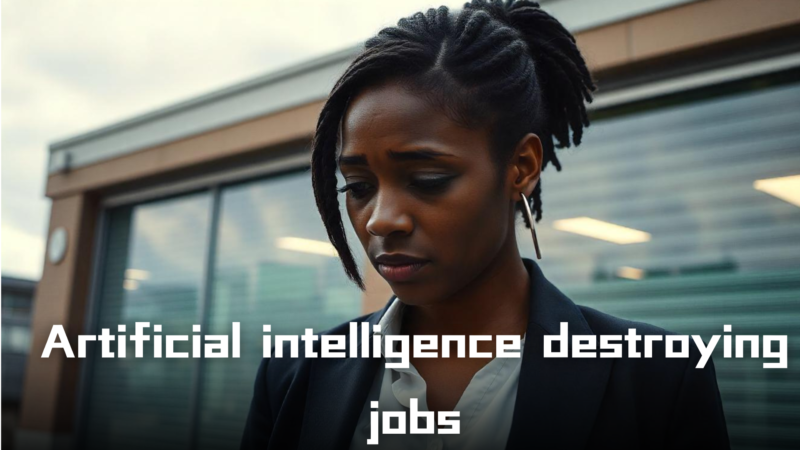Artificial intelligence destroying jobs

Artificial intelligence destroying jobs
Is Artificial Intelligence Destroying Jobs? Understanding the Impact of AI on Employment
This blog will discuss how AI affects employment, and which type of jobs will be at the greatest risk; it will further touch upon how individuals and industries can adapt to this kind of technological revolution.
The Rise of AI and Automation in the Workplace
Over the past decade, AI technologies have become more sophisticated, capable of performing tasks that once required human intelligence and decision-making. From chatbots handling customer service inquiries to algorithms driving complex financial trading decisions, AI is being integrated into nearly every sector. Automation, powered by AI, is particularly prevalent in industries like manufacturing, transportation, and retail, where routine, repetitive tasks can be easily handled by machines.
Companies are investing in AI to improve efficiency, cut costs, and enhance productivity. Tasks that used to take hours can now be completed in seconds by AI systems, and as these technologies become more advanced, the reliance on human labor for certain jobs is diminishing.
But does this mean that AI is actively destroying jobs? The answer is more nuanced than a simple yes or no.
Jobs Most at Risk Due to AI
Not all jobs are equal when it comes to AI-driven automation. The jobs with the greatest risk tend to be repetitive, low-level tasks that most easily can be codified into an algorithm. Some of the jobs at the greatest risk of automation are:
- Manufacturing and Assembly Line Jobs AI-powered robots are gaining popularity at factories. Such machines can work 24 hours in a day without any break, can be very efficient while performing cyclic tasks, and require minimal human intervention. Because an automated production line can substitute hundreds of human workers, this situation has made various industries such as automobile and electronics manufacturing heavily deductive of human employment.
- Other than managing workflows, the retail and cash register position is also penetrated by AI and automation. Self-checking machines and kiosks equipped with AI are replacing human cashiers at store tills. All inventory tracking and reorders are also automated. Moreover, AI-integrated shopping platforms have been reducing significantly the number of bricks and mortar retail shops required, which reduces the number of human laborers even further.
- Transportation and logistics services. Autonomous vehicles are definitely going to change the face of transportation. It won’t be long before AI-driven trucks and drones replace truck drivers and couriers. Companies such as Tesla and Waymo are already testing out self-driving cars, which promise a further diversification of logistics opportunities.
- Data Entry and Administrative Roles Even routine back-office work like data entry, scheduling, or invoicing is becoming automated through AI tools. Algorithms can process massive amounts of data fast and accurately so that people have less need for indulging in such chores.
- Customer service AI-powered chatbots and virtual assistants are being designed to become extremely proficient in handling all customers’ queries and problems, and provide as much support as possible without the intervention of humans. The most common customer-dealing industries are banking, insurance, and tech support
The Argument for AI Creating Jobs
In fact, it is correct that artificial intelligence dislocates particular jobs. However, one must not forget that artificial intelligence creates new opportunities as well. In fact, technological progress has always disrupted certain kinds of industries and created new ones. AI is no exception in this regard. Here are a few examples of how AI creates jobs:

- New Jobs in AI Development and Maintenance The high skilled sets needed for the development and implementation of AI systems enter the market. From AI developers to data scientists, machine learning engineers, among many others-these jobs are high in demand. As new companies arrive to use AI technologies, new jobs will emerge to maintain and monitor these widespread AI systems.
- AI in Creative and Analytical Professions Contrary to the fear that AI will replace human creativity, AI can help professionals working in marketing, designing, and content creation by processing data analysis and forecasting trends. AI helps humans be efficient and free up some spare time for creative and strategic thinking rather than for administrative or other mundane tasks.
- Reskilling and Upskilling Opportunities Most workers in industries shaped by AI will have an opportunity to shift to new roles. Governments and companies can offer reskilling programs that allow the movement of workers into higher-value jobs, acquiring new skills. For example, although AI can perform basic data analytics, its human interpretation and acting upon these results provide an avenue for more advanced skills in data-driven industries.
- AI Creating Brand-New Industries The Internet gave birth to jobs that did not even exist thirty years ago—that is, social media managers, app developers, and e-commerce specialists. AI will be no different: where does that leave us? Who knows? That is exactly the point. AI will give birth to new industries and roles we cannot yet envision fully. These new opportunities will come as the technology continues to evolve, using human skills in new ways.
How can we balance the impact of AI at work?
Evidently, AI is going to keep shaping the job market in many ways. However, very few perspectives require a high need to use strategies focusing not only on innovation in technologies but also on maintaining jobs. Here are some key suggestions for an approach that is balanced:
- Investments in Education and Training Reskilling and upskilling by governments, businesses, and institutions of learning should be done to prepare workers for jobs of the future. Program training in AI-related sectors like data science, coding, and digital illiteracy will help workers figure their way around their new roles, stay ahead of their competition in an economy built around AI, or lose their advantages in the job market.
- Instead of considering AI as a substitute for human labor, businesses should be looking at ways to collaborate between humans and AI. This way, AI can be used in augmenting human productivity by taking redundant tasks where humans focus on emotionally intelligent and creative efforts and more complex decision-making processes.
- Imaginative jobs that will not be easily Automated Policymakers and business leaders should pay attention to innovative roles in health care, education, and the creative industries – these are areas where AI can assist and support these professions by the application of qualities such as empathy, critical thinking, and one-to-one engagement.
- Encourage Ethical AI Development There must be development in ethical AI systems that would work to ensure fair and transparency conditions are met, thus stopping the perpetuation of inequality in the workplace. This is necessary because bias-free AI systems applied responsibly could prevent unfair worker displacement and ensure a fair job market.
Conclusion
AI will certainly change the job market, displacing some jobs and creating others. While that is true, the story that AI destroys jobs without offering much beyond the destruction of work, innovation, and new industries it can propel, isn’t heard about. Though it is imperative to take risks about AI and automation seriously, a reskilling of the workers, keeping abreast of more AI-human collaboration, and the creation of jobs in emerging fields can help human society tread its future with an AI-driven world.
So, going forward, we should be balancing embracing the benefits of AI in order not to have workers left behind in the process. And as we proactively address these challenges, we build a future where AI unlocks more work opportunities rather than destroying them.
Important Link
- How did Kris Kristofferson die
- How to sign in bank of America online
- Millie Bobby Brown and Jake Bongiovi: A Love Story for the Ages
- India Women vs South Africa Women Cricket Match 2024
- Is Iran attacking Israel
- What happened to John Amos
- How many leagues are there in sports
- What are sports leagues
- How many times India beat Bangladesh?
Disclaimer: chronobazaar.com is created only for the purpose of education and knowledge. For any queries, disclaimer is requested to kindly contact us. We assure you we will do our best. We do not support piracy. If in any way it violates the law or there is any problem, please mail us on chronobazaar2.0@gmail.com
